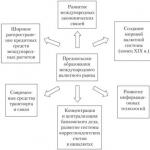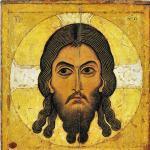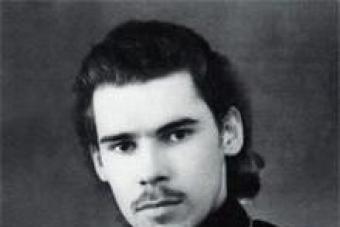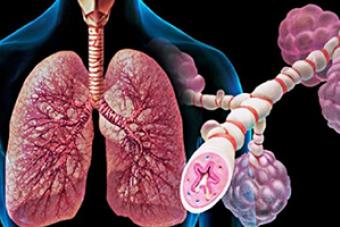Relatives and friends of six-year-old Vanya Mochenkov from the village of Matveevskoye knew that if artificial heart valves were not immediately placed in him, he would not live even three years. The operation was performed by a cardiac surgeon, Doctor of Medical Sciences, Professor Viktor Alekseevich Ivanov at the Russian Scientific Center for Surgery named after A.I. Petrovsky RAMS, became unique: not only were two artificial valves sewn into Vanya’s heart at once, but, most importantly, one of them was replaced with a new generation artificial tricuspid prosthesis. This is "Tricardix" - the development of Russian scientists.
Today, Vanya goes to school calmly every day, and only annual examinations remind of heart defects.
Every year more than a million people die from cardiovascular diseases in Russia, 55-60% of deaths are due to vascular diseases, 20-25% - to valve damage. Drug treatment for valve damage is effective only for a while - the drugs constantly spur the heart muscle. If the operation is not done, the patient will have to change the entire rhythm of life: serious physical activity and psychological stress will be dangerous for him.
There are two types of artificial valves: mechanical and biological. “Mechanical valves in the world now are primarily bicuspid (bicuspid); biological valves are tricuspid, tricuspid, that is, more similar to valves that work in a healthy heart,” says Doctor of Medical Sciences, Professor Alexander Lishchuk, Head of the Department of Cardiac Surgery of the Central Military Clinical A. A. Vishnevsky Hospital - Biological valves are more functional: they are made from animal tissues, such as pigs, or taken from corpses. The problem is that biological valves are short-lived - they work for 7-10 years, so young patients, of course, usually put mechanical valves.
The work of mechanical prostheses is accompanied by noise, but this is not their main disadvantage. The installation of a mechanical valve causes severe hemolysis - the breakdown of red blood cells, and the patient becomes required to take lifelong anticoagulants - drugs that will reduce the risk of a blood clot.
Two artificial valves were sewn into the heart of Vanya Mochenkov at once, one of which was a new generation artificial tricuspid prosthesis "Tricardix"
The situation can be changed by the innovative development of the researchers of the Russian specialized company "Roscardioinvest" - the same "Tricardix" sewn to Vanya Mochenkov. This prosthesis combines the characteristics of biological and mechanical artificial valves, has already passed clinical trials and, possibly, will be mass-produced. “This valve works like a natural one,” explains Regina Kevorkova, deputy general director of Roscardioinvest for quality. “There are no elements in the valve passage, and there is no breaking of blood cells, so the risk of blood clots is minimized. there is a chance to reduce, and in the future, perhaps completely cancel the patient's intake of anticoagulants.
But "Tricardix" is a mechanical prosthesis, its service life is practically unlimited. “We have developed a technology for nanolayer implantation of carbon into the surface of titanium, which is now used as a material for mechanical valve bodies,” says Alexander Samkov, CEO of Roskardioinvest. “The most biocompatible material today is carbon; accordingly, the more carbon element in any design, the better he is perceived as less alien."
Manufacturable and the material of the valve flaps is pyrolytic carbon. The cuff, with which the prosthesis is attached to the heart, can be made in two versions - white polyester or carbon cloth. The cuff is universal and allows sewing the Tricardix valve into the fibrous ring in any position, regardless of the degree of its destruction.
So far, 45 Tricardix valves have been implanted. The first such operation was performed by Academician of the Russian Academy of Medical Sciences L.A. Bokeria in June 2007 at the Scientific Center for Cardiovascular Surgery named after I. A. N. Bakuleva. Clinical trials took place in the largest cardiosurgical centers in Moscow: in the N.N. A. N. Bakuleva RAMS, in the RNCH them. BV Petrovsky RAMS under the direction of Viktor Ivanov, as well as in the military hospital. A. A. Vishnevsky, where Alexander Lishchuk was involved in the implantation of new valves.
Roscardioinvest presented a full size range of tricuspid valves, and this makes it possible to talk about the universality of the development: the new valve can be introduced into the heart of any size to replace any affected valve, and therefore into the human body of any age and any complexion.
“The course of the operation for the introduction of Tricardix does not differ from how we operate using standard bicuspid valves,” says Alexander Lischuk. “This is a standard operation: we also turned off the heart from work, removed that worn or damaged valve, installed instead valve with three leaves, sutured - we just acted with the feeling that the tricuspid valve could improve the quality of life of the patient. In our hospital, the first operation was performed with the implantation of "Tricardix" in the aortic position three years ago, then we began to use new valves quite actively" .
But it is too early to talk about the successful commercialization of the new technology. Despite the receipt by the Roscardioinvest company of the registration certificate of the Federal Service for Supervision of Health and Social Development, as well as a separate license for Tricardix, despite the products being certified, the launch of mass production of tricuspid valves cannot be carried out without financial support. “We planned a project for production at Rusnano, managed to pass all the stages of examination, and in 2009 the Supervisory Board of Rusnano made the final decision to approve the industrial production of tricuspid valves,” recalls Alexander Samkov. “A condition for investment by Rosnano” there was a co-investor, in whose role the Moscow Venture Company was ready to act. We were to receive 930 million rubles from Rosnano, 187 million rubles from the Moscow Venture Company. But after leaving the post of Moscow Mayor Yuri Luzhkov, development in In Moscow, innovative projects containing intellectual property have stopped, and accordingly, Rosnano was unable to provide us with financial support."
According to Regina Kevorkova, patents for all types of structures and for all technological methods of Tricardix implantation were obtained by Roscardioinvest in 2002-2009, and not only in Russia - intellectual property is protected in the USA, Asian countries, and South Africa. In 2009, Ernst & Young estimated the market value of the exclusive rights to develop the valve at 372 million rubles. Today, Chinese and Iranian investors are actively interested in Tricardix. But the leadership of Roscardioinvest does not plan to take away the unique technology abroad yet. “We do not give up and hope that Tricardix tricuspid valves will be able to reach the level of mass production in Russia. There are already interested investors who may provide us with financial assistance,” concludes Alexander Samkov.
It is known that friendship and assistance to a person are tested by misfortune or adversity. You can communicate with pleasant-looking people for years, bow and talk nicely, but in a difficult hour they may not be around. I have a completely different case, which I would like to talk about in this note.
Trouble happened to me, or rather, I went to it myself with leaps and bounds. Systematically visiting a military polyclinic in Moscow, to which I was attached as a reserve officer and a veteran submariner, I did not pay due attention to the insistent recommendations and even persuasion of cardiologist Nikolai Yuryevich Luzgin to go to the hospital and be carefully examined for malfunctions in the cardiovascular system. And when he approached the dangerous line, when the blood pressure dropped significantly, and the pulse did not rise above forty beats per minute, he asked for an ambulance. She could not help me in any way, but the next day I was brought to the Goritsky polyclinic, where the doctor Vladimir Anatolyevich Salov saw me. After studying the cardiogram, he made the correct diagnosis - blockade of the atrioventricular node and said that he should immediately go to the hospital. Only after that I decided to go and "surrender" to military doctors.
I want to immediately express my deep gratitude to Evgeny Sergeevich Belov and Lyudmila Ivanovna Ponomareva, who immediately organized my delivery, first to Kimry by ambulance, accompanied by nurse Tatyana Sergeevna Baranova, and then from there to Moscow. I am extremely grateful to Olga Aleksandrovna Petrova and the driver Evgeny Borisovich Avdeev, who, regardless of their personal time, carefully drove me to the Moscow Ring Road, and there my daughter Natasha brought me to the A. A. Vishnevsky Central Military Clinical Hospital of the Ministry of Defense of the Russian Federation. In the admission department of the hospital, both my daughter and I were greatly reproached, calling us the bad word “kamikaze” for not stopping by any nearest hospital on the way from Kimry to get first aid there.
A few minutes later, measures were taken in the intensive care unit to prevent an irreparable outcome from happening. The next day I was admitted to the Heart Cardiac Surgery Center, where they began a thorough examination of my half-dead "motor". After a few days, my health improved significantly, and I already thought that all the bad things were left behind. Well, they will put up a couple of stands, well, they will prescribe new drugs and let them go home. Soon I had coronary angiography, and all illusions were shattered to smithereens. The reality was harsh. Professor Aleksey Nikolaevich Koltunov, head of the Department of Cardiac Surgery, came to my ward and told me in detail that one cannot do without heart surgery. It is necessary to bypass the coronary arteries, replace the mitral valve, examine the pulmonary artery, and more. He made no secret of the fact that the operation would be very difficult, he had to be prepared for anything, he recommended to consult with relatives. And at the end of the conversation he asked if I was ready for this operation. I firmly, without hesitation or doubt, answered that I agreed to the operation and was ready to sign the necessary documents. The moral preparation did not end there. The next day, during a medical round, I was already asked about the readiness for the operation by the head of the Center for Heart Surgery, Doctor of Medical Sciences, Professor Alexander Nikolayevich Lishchuk. I still expressed my complete readiness for the operation. Two days later, the operation was scheduled.
Separately, I would like to express my infinite gratitude and appreciation to the surgical team, which consisted of twelve people. These are top professionals. Cardiac surgeons A. N. Lishchuk and A. N. Koltunov and their assistants performed the operation with the help of specially trained nurses. Anesthesiologist Professor Andrey Nikolaevich Kornienko monitored the anesthesia carefully calculated by him. Other doctors operated the "artificial heart and lungs" setup, monitored pressure, temperature and respiration during the operation. The operation lasted four and a half hours, not everything went according to a previously developed plan, the doctors had to make some decisions during the operation. Eight hours later I woke up, Natasha was standing at the head of the bed and anxiously waiting for me to give her a signal that everything was fine, I winked at her. Before that, the doctors told Natasha that the operation was successful. A day later, when I had already completely recovered, I was taken to the second operation, it was necessary to install a pacemaker. But this is already a very simple matter, as the cardiac surgeon Roman Semyonovich Lordkipanidze told me. Under local anesthesia in twenty minutes, the doctor sewed me an pacemaker.
I am deeply convinced that the success of such a complex heart operation is predetermined by three major components. First. This is a huge experience and talent of cardiac surgeons and the entire team. Many are accustomed to scolding our medicine, they say, everything is bad here, but in the West it is good. From my own experience, I was convinced that military medicine is at the very forefront of the struggle for a person. Incidentally, in the United States, a 3.5 percent death rate from heart surgery is considered a scientifically substantiated norm. But in the Center for Heart Surgery, which is headed by Alexander Nikolaevich Lishchuk, this figure is 1.5 percent. This is despite the fact that two coronary artery bypass grafting operations per day are performed here. Each of the military doctors I have named, apart from everything else, does a great deal of scientific and teaching work. Their inventions in surgery are used in many other institutions. After two weeks of treatment at the A. A. Vishnevsky Hospital, I was transferred to a branch of this hospital in the city of Khimki. Here, the head of the cardiology department, Candidate of Medical Sciences Igor Evgenievich Guzenko, and the resident Ekaterina Alexandrovna Pavlova developed and implemented a successful algorithm for my rehabilitation.
Second. This is a great and absolutely disinterested support for me by my family, relatives, friends and good acquaintances. A special place in this support and care for me belongs to my beloved daughter Natalia. For the first days after the operation, she did not leave me almost around the clock, having moved to live in my ward. And then almost every day she came to visit me at the hospital, bringing with her a change of clothes, fruit, the press (including the newspaper "Kimrsky vestnik") and much more. During her stay in the hospital and the sanatorium, our granddaughter Natasha, who, having left her business, came to the village, provided invaluable help around the house to Valentina Petrovna. My niece Natalya, as well as Lyudmila Nikolaevna Bilashenko, who helped her with the housework, treated Valentina Petrovna with great attention and care. In addition, Lyudmila Nikolaevna more than once replaced my daughter in the hospital, providing me with moral support. My beloved granddaughter came to the hospital with her husband Maxim. And before that, in the first difficult days for me, she sent me a letter in which there were such words: “Grandfather, my dear and beloved! Remember that we all love and respect you endlessly. We wish you a speedy recovery every moment."
Many friends called me to the hospital, worried about me, and I felt this support. Among them: Belov, Belousova, Novozhilova, Ishchenko, Ponomareva, Ignatieva, Sukovatitsyn, Strelnikovs, Orlovs, Borisovs, Lobanovs, Lebedevs, Ryazantsevs and others. My wife, Valentina Petrovna, was not able to come to the hospital, but she tirelessly worried about me, prayed for a successful recovery, and called me every day with words of support and attention. I always felt her concern.
And third. Without undue modesty, I will say that, deeply aware of the complexity of the operation, I firmly believed in its success, I believed the doctors, there was not a shadow of a doubt in its success. There was absolutely no fear, apparently also because, being a submariner, I was used to not giving vent to my emotions, a firm and cold-blooded calculation was at the head. I knew well the words of Dante: “Here it is necessary that the soul be firm, here fear should not give advice ...”. And being to some extent a fatalist, I believe that whoever is destined to be hanged will not drown. Once again I want to express my deep gratitude, gratitude and love to all those who supported me in the difficult days of my life.
The Cardiac Surgery Center is located on the basis of the 3rd Central Military Clinical Hospital. A.A. Vishnevsky in the nearest Moscow region, six kilometers from the Moscow Ring Road in the immediate vicinity of the city of Krasnogorsk (see diagram).
Center structure
The Center is run by Lischuk Alexander Nikolaevich, Doctor of Medical Sciences, Professor, Honored Doctor of the Russian Federation. Cardiac surgeon of the highest qualification, who underwent training and improvement in cardiac surgery clinics in the USA and Germany. Professor Lishchuk A.N. is considered one of the leading specialists in the field of reconstructive operations on the valvular apparatus of the heart and aorta, repeated operations, coronary surgery. Author of two monographs and 5 methodological recommendations, both for medical specialists and for patients. He is the "locomotive" of the center, the author of many innovative ideas, more than 150 scientific papers and rationalization proposals.
The center includes the following departments:
1. Department of surgical treatment of acquired and congenital heart defects, comorbidity (and / about the head Koltunov Alexey Nikolaevich
2. Department of surgical treatment of coronary heart disease (head of department Ilyukhin Mikhail Anatolievich, candidate of medical sciences, doctor of the highest qualification category.
Cardiac surgery department 3 CVKG them. A.A. Vishnevsky was opened on September 1, 1987. The department is intended for the diagnosis and treatment of patients with various forms of coronary heart disease, cardiac arrhythmias, diseases of the valvular apparatus of the heart, aorta and pericardium. The department is located on the 11th floor of the therapeutic building, deployed for 7 beds. Patients are accommodated in the department in 1 and 2-bed comfortable wards. The department is staffed by courteous and professionally trained staff. Our department develops and implements unique methods of surgical treatment of coronary heart disease, including operations on a beating heart, total auto-arterial coronary artery bypass grafting. Issues of continuity in providing assistance to cardiac surgical patients with their further rehabilitation have been worked out. The doctors of the department regularly undergo professional development on topical issues of cardiac surgery, both in leading Russian centers and abroad.

Ilyukhin Mikhail Anatolievich, Department Director
Graduated from the medical faculty of the Ivanovo State Medical Academy in 1995. Since 2009, the head of the 22nd cardiosurgical department. Doctor of the highest qualification category.
Candidate of Medical Sciences.
Lemeshkin Andrey Alexandrovich, senior resident
Graduated from the Orenburg State Medical Academy in 1999. Doctor of the highest qualification category. Candidate of Medical Sciences.
Mikhailov Denis Valerievich, resident
Graduated from the Saratov State Medical Academy in 1996.
Doctor of the highest qualification category.
Ketskalo Mikhail Valerievich, senior resident
Graduated from the Siberian Medical University in 1994. Anesthesiologist-resuscitator of the center of cardiac surgery, doctor of the highest qualification category, candidate of medical sciences.
Areas of work of the department
Examination and treatment of patients with heart disease:
- Coronary heart disease.
- Congenital and acquired heart defects.
- Combined pathology of heart valves and coronary arteries.
- Diseases of the pericardium.
- Tumors of the heart.
Operations carried out in the department:
- Autoarterial coronary artery bypass grafting.
- Combined surgical interventions on various arterial basins.
- CABG + LV aneurysm repair
- CABG + endarterectomy
- Valve prosthetics
- Surgical correction of defect + CABG
- ASD plastic surgery
- Reoperations on the heart (reCABG, reprosthetics)
The frequency of postoperative complications is 0.6-1.3%.
Postoperative mortality - 1-2%.
3. Department of Emergency Cardiac Surgery (Head of Department Bykov Vladimir Ivanovich, Doctor of Medical Sciences, doctor of the highest qualification category)
4. Cardiosurgical Department of Surgical Treatment of Patients with Rhythm and Conduction Disorders (Head Roman Semenovich Lordkipanidze)
Information about the department for patients with cardiac arrhythmias
 5. Department of Anesthesiology, Resuscitation and Intensive Care (Head Kornienko Andrey Nikolaevich, Doctor of Medical Sciences, Professor, Honored Doctor of the Russian Federation).
5. Department of Anesthesiology, Resuscitation and Intensive Care (Head Kornienko Andrey Nikolaevich, Doctor of Medical Sciences, Professor, Honored Doctor of the Russian Federation).
6. Directly within the center there is a cardiopulmonary bypass department, an express laboratory, and an operating room.
The capabilities of the Center for Cardiac Surgery allow for a full and comprehensive examination of cardiac patients in the shortest possible time, without lengthening the time of hospitalization. After a scheduled consultation and the presence of indications, you will be offered the best treatment option for your disease, including preoperative preparation, the operation itself and postoperative treatment with modern drugs and methods with the possibility of a further course of rehabilitation in a sanatorium, or with the help of our author's methods at home with the active involvement of relatives and friends. .
Accommodation conditions for our patients
Patients are accommodated in comfortable single or double rooms with all necessary amenities.
Highly qualified doctors and nurses, in addition to the main treatment process, will create an atmosphere of comfort. Nutrition of patients is carried out taking into account the diet. We strive to actively involve our patients in the process of their recovery. As a rule, patients who have been operated on earlier, by an example of their condition, a story about their feelings, their physical activity will allow you to reduce the feeling of fear and fear before the operation. People close to you may be close to you.
We never forget our patients. Advisory assistance and advice can be provided at any time after your discharge. Moreover, we are interested in further contacts with former patients in order to correct drug therapy in time. After all, many conditions require constant medication, the effect of which must be monitored by specialists.
I don't know why this hospital is considered good. It hasn't been like that for a long time. There is no funding. Who does not believe - in the courtyard behind the neurosurgery building there is a chic new building that has not been functioning for many years, expensive equipment is rotting in the basement, because there is no money to complete the building and put it into operation. My father was in the hospital under Sogaz insurance, we were transferred from the Central Clinical Hospital with a terrible diagnosis of brain cancer, an urgent operation was needed, at the end of December 2012. Without money, they won’t come to you at all and, what’s scary, they won’t come for money. My father underwent a neurosurgical operation, a brain cancer tumor was excised. The operation went very well, the surgeon Miklashevich Eduard Rishardovich is a professional from God, on the trail. The day after the operation, the father was discharged from the intensive care unit, he spoke, was completely adequate. But then, the New Year holidays came. And instead of improving, my father almost died. There was no one left in the hospital. They don't give doctors mobile phones, I sat alone with my father, the nurses only came in to give injections twice a day. No amount of money could make them work. Once, leaving for the night, she left them a bottle of Italian champagne for 2,000 rubles, good chocolates and 1,000 rubles in cash, so that they would come to him at night, because after the operation there was insomnia and nightmares at night. My father, always a strong and firm man, cried with fear like a child, they closed him in a stuffy ward so as not to interfere with the nurses' sleep apparently, and they took away the nurse's call button, hid behind the bed, he could not reach, I paid for a paid ward with a TV, but they were even too lazy to turn on the TV for him! And he lay in stuffiness, darkness, for hours without sleep, motionless, because there was a paresis of the entire right side! In short, out of 4 nurses on duty, 2 were normal, and two were just sadists. I did their work, sat with my father from 10 am to 10 pm and drove home every day for 55 km (I live in Lyubertsy). So while I was gone, he was not even always changed diapers and fed! Although every evening before leaving, I always left 500 rubles each to look after! In Moscow, this is a normal price for a nurse, but in this hospital, the sisters do not consider this money! I asked them to help find a nurse, because it’s hard for me to travel every day, but they announced the price of 4,000 rubles per day! And then only after the holidays, because on holidays they rest. The doctors at the hospital aren't much worse. During the holidays, there were 3 patients left on the floor, who were apparently so severe that they could not be discharged. Doctors DID NOT SUIT themselves at all! every time I caught them for half a day, dragged them into the ward. Despite the fact that immediately before the operation I distributed money and expensive cognac to everyone, then even after. And plus my father walked like a commercial patient, the insurance company paid huge sums for us. This is the first time I have encountered such a condition of a patient, I am not a doctor, I did not know what to do with a bed patient in general. And no one told me how to care. No one even advised to do something urgently or hire a professional for money. Although, an exercise therapy specialist and massage should have been provided to us free of charge under insurance! But the massage was only after the New Year holidays from January 10, and the exercise therapy specialist said that he would do it only for cash, because you see, he doesn’t get anything from the money that the insurance company pays by bank transfer, everything settles in the administration . I tried to argue and say that I am not an oligarch either, and that if the insurance pays, then I am not obliged, but he was adamant. I had to pay for him to put dad on his feet and teach him to walk again with paresis of the leg. But it was only later, and at first I observed a worsening of the condition every day. After a week of such lying, the father was already talking, almost did not move. I ran around the floors, looking for doctors on duty, begged me to come in, but they ignored me or came in, but just for show. And only one kind doctor, unfortunately, I don’t know the last name, with a Korean appearance, said that, it turns out, it was necessary to put the patient on the bed from 3 days after the operation, taught me to do this, fixing it with a chair, and also taught me to do all sorts of procedures so that there is no stagnation in the lungs. I did it all myself, it was very hard. Some nurses helped me change dirty wet sheets and diapers under my father, some frowned in disgust and refused to help. And most importantly, in the end, when the diagnosis of cancer was officially confirmed (histology, biopsy) - under the insurance contract, they no longer had to pay for treatment. And we were immediately discharged from the hospital. The bedridden patient. Who ate ate could take a couple of steps along the corridor with the support of a specialist. I asked, begged not to be discharged, there must be some kind of recovery, procedures, rehabilitation. I was ready to pay myself for a further stay. But no, we were kicked out. They didn't provide an ambulance or anything. I had to hire loaders, they brought my father home in their arms, because we have a 2nd floor without an elevator. You know, this is a terrible hospital, terrible attitude towards patients. Even for the money you are not people there.





